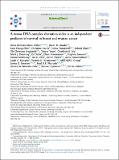A tumor DNA complex aberration index is an independent predictor of survival in breast and ovarian cancer
Abstract
Complex focal chromosomal rearrangements in cancer genomes, also called "firestorms", can be scored from DNA copy number data. The complex arm-wise aberration index (CAAI) is a score that captures DNA copy number alterations that appear as focal complex events in tumors, and has potential prognostic value in breast cancer. This study aimed to validate this DNA-based prognostic index in breast cancer and test for the first time its potential prognostic value in ovarian cancer. Copy number alteration (CNA) data from 1950 breast carcinomas (METABRIC cohort) and 508 high-grade serous ovarian carcinomas (TCGA dataset) were analyzed. Cases were classified as CAAI positive if at least one complex focal event was scored. Complex alterations were frequently localized on chromosome 8p (n = 159), 17q (n = 176) and 11q (n = 251). CAAI events on 11q were most frequent in estrogen receptor positive (ER+) cases and on 17q in estrogen receptor negative (ER) cases. We found only a modest correlation between CAAI and the overall rate of genomic instability (GII) and number of breakpoints (r = 0.27 and r = 0.42, p <0.001). Breast cancer specific survival (BCSS), overall survival (OS) and ovarian cancer progression free survival (PUS) were used as clinical end points in Cox proportional hazard model survival analyses. CAAI positive breast cancers (43%) had higher mortality: hazard ratio (HR) of 1.94 (95%CI, 1.62-2.32) for BCSS, and of 1.49 (95%CI, 1.30-1.71) for OS. Representations of the 70-gene and the 21-gene predictors were compared with CAAI in multivariable models and CAAI was independently significant with a Cox adjusted HR of 1.56 (95%CI, 1.23-1.99) for ER+ and 1.55 (95%CI, 1.11-2.18) for ER disease. None of the expression-based predictors were prognostic in the ER subset. We found that a model including CAM and the two expression-based prognostic signatures outperformed a model including the 21-gene and 70-gene signatures but excluding CAAL Inclusion of CAAI in the clinical prognostication tool PREDICT significantly improved its performance. CAAI positive ovarian cancers (52%) also had worse prognosis: HRs of 1.3 (95%CI, 1.1-1.7) for PFS and 1.3 (95%CI, 1.1-1.6) for OS. This study validates CAM as an independent predictor of survival in both ER+ and ER breast cancer and reveals a significant prognostic value for CAAI in high-grade serous ovarian cancer. (C) 2014 The Authors. Published by Elsevier B.V. on behalf of Federation of European Biochemical Societies. This is an open access article under the CC BY-NC-ND license (http://creativecommons.org/licenses/by-nc-nd/3.0/).
Citation
Vollan , H K M , Rueda , O M , Chin , S-F , Curtis , C , Turashuili , G , Shah , S , Lingjaerde , O C , Yuan , Y , Ng , C K , Dunning , M J , Dicks , E , Provenzano , E , Sammut , S , McKinney , S , Ellis , I O , Pinder , S , Purushotham , A , Murphy , L C , Kristensen , V N , Brenton , J D , Pharoah , P D P , Borresen-Dale , A-L , Aparicio , S , Caldas , C & METABRIC Grp 2015 , ' A tumor DNA complex aberration index is an independent predictor of survival in breast and ovarian cancer ' , Molecular Oncology , vol. 9 , no. 1 , pp. 115-127 . https://doi.org/10.1016/j.molonc.2014.07.019
Publication
Molecular Oncology
Status
Peer reviewed
ISSN
1878-0261Type
Journal article
Collections
Items in the St Andrews Research Repository are protected by copyright, with all rights reserved, unless otherwise indicated.

